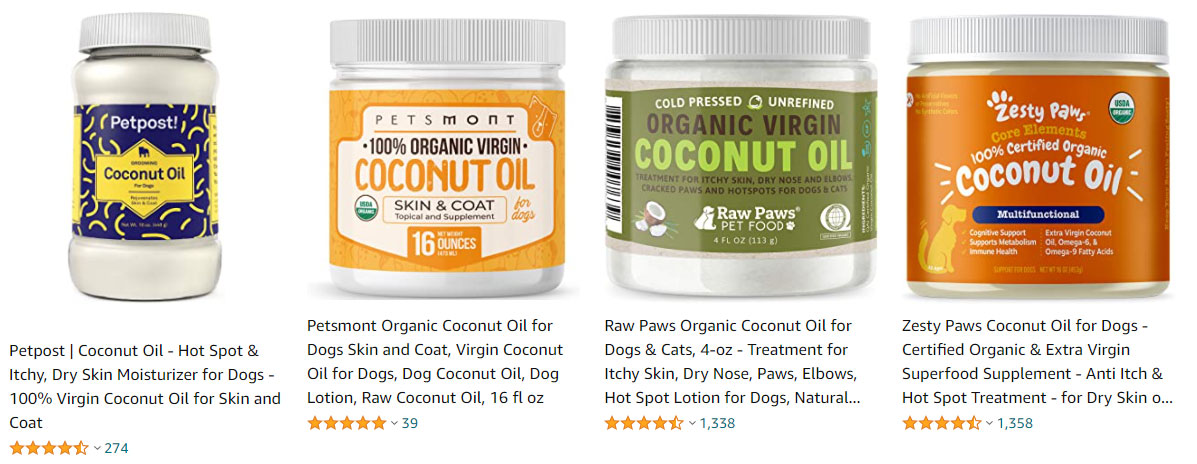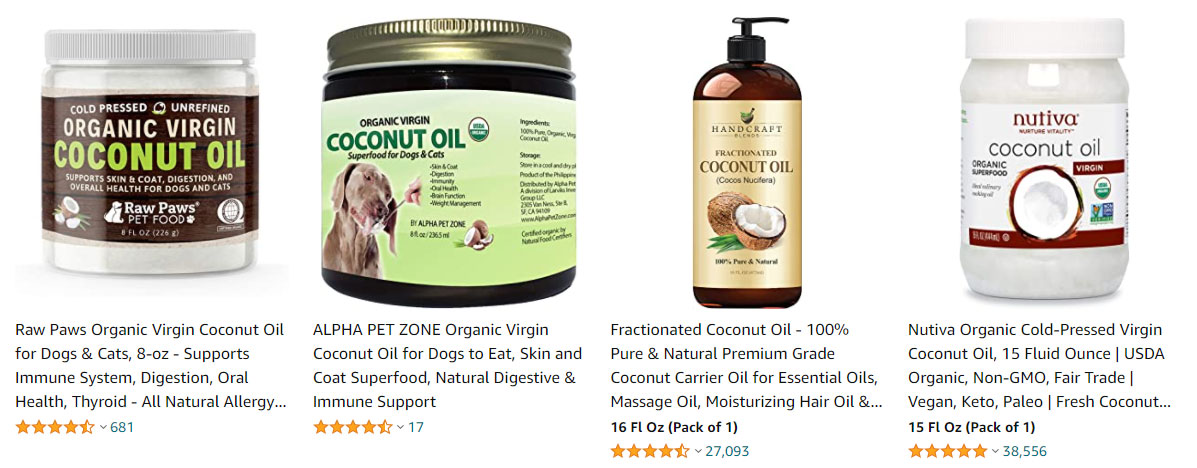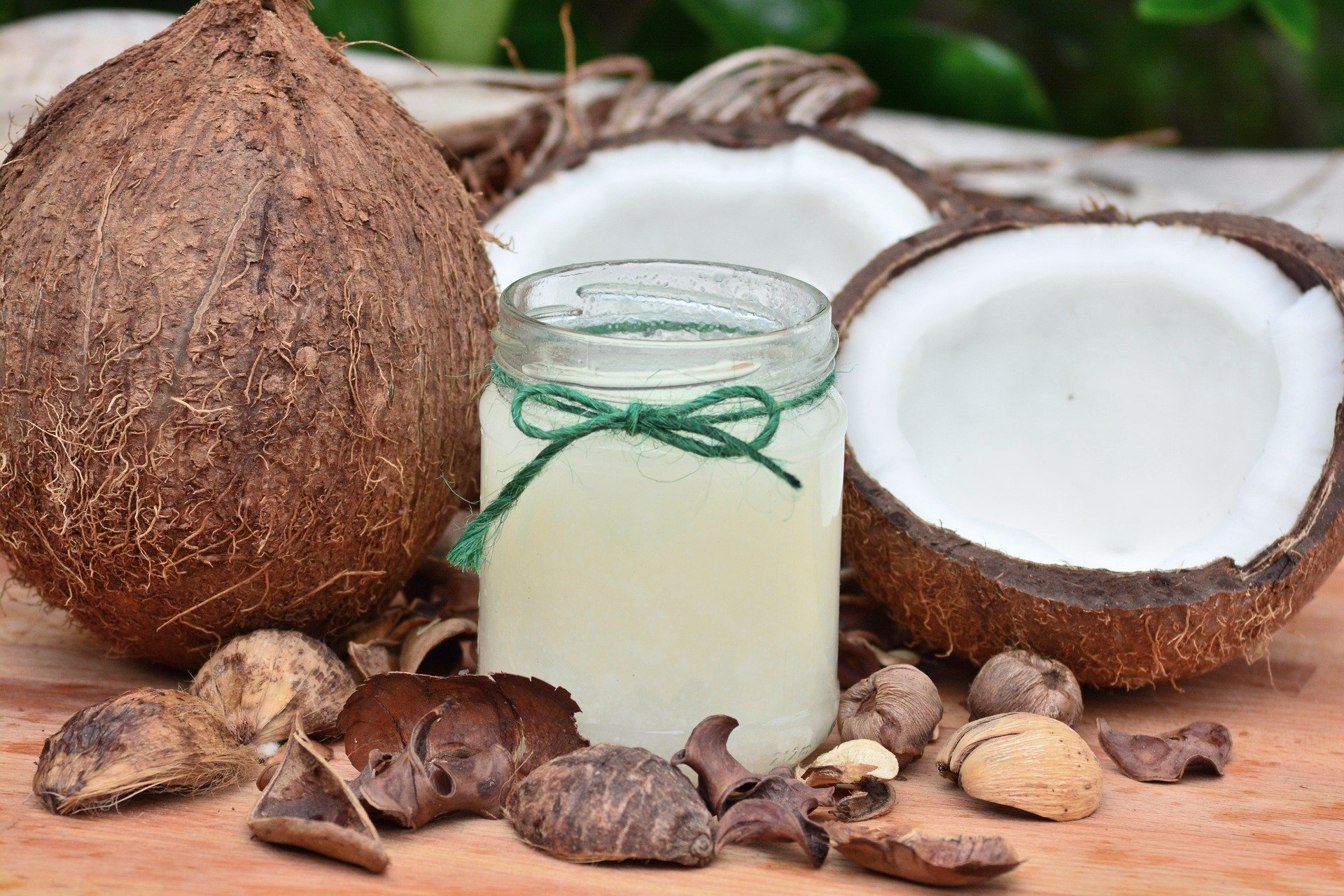Coconut oil for dogs
Coconut oil seems to have become the new miracle ingredient in fashion, as beneficial from a food and cosmetic point of view.
It's no wonder that owners are looking into its potential health benefits for their dogs, as natural remedies are more popular than ever. However, coconut oil does not have only benefits, far from it, and it is necessary to know well this product and its effects on the health of your dog before using it on him.
What is coconut oil for dogs?
Coconut oil is a substance extracted from the albumen (reserve organ) of the coconut, fruit of the coconut palm. Widely used in tropical countries, coconut oil has been used for centuries for its therapeutic, dietary and cosmetic properties.
There are two types of coconut oil that are often confused: virgin coconut oil (the "real" coconut oil), and refined coconut oil, also called coconut oil. Currently, many products are labeled "coconut oil" but actually refer to coconut oil.
Unfortunately, this is also the case in the literature on the subject, and there are many studies that confuse these two substances, which have different virtues and uses. Copra oil is obtained from the dried flesh of the coconut, which is pressed while hot. It is odorless, opaque and solid at room temperature.
Virgin coconut oil is cold-pressed to preserve the integrity of its natural compounds. It is more crystalline and spreads a very marked coconut smell. In fact, the composition of coconut oil and coconut oil remains very similar, although the vitamin E content decreases during the hot extraction process and is therefore lower in coconut oil.
On the other hand, coconut oil can be altered by the substances and processes used in its refining, which is why it is less favored by purists. It is, however, the most used in the cosmetic and culinary industry, because the hot extraction allows a higher yield and makes it an inexpensive material, unlike virgin coconut oil.
The eternal debate about coconut oil for dogs
Opinions are divided in the scientific sphere as to the benefits of coconut oil for humans, and few studies have been carried out on dogs.Previously decried for its high content of saturated fatty acids (or "bad cholesterol"), coconut oil has experienced, in recent years, a resurgence in popularity at a time when traditional medicine is making a comeback to treat small injuries.
Long used for therapeutic purposes in tropical countries where coconut is endemic, coconut oil is known for its multiple benefits on the body, without however that its mechanism of action is completely explained. It is said to have antibacterial, antiparasitic, slimming, anti-inflammatory and healing properties... In other words, coconut oil seems to be able to be used to treat all ailments.
However, the analysis of its composition is without appeal: it is one of the vegetable oils of the poorest in vitamins, and the richest in "bad cholesterol". However, the fatty acids it contains are in a particular form (medium chain) which motivates the arguments in favor of its use, arguing that they are better metabolized by the body, regulate blood sugar and reduce the risk of cardiovascular disease.
However, a study analyzing the results of multiple previous studies on the subject concludes that coconut oil does not actually provide any benefits on cardiovascular health and weight gain (2 However, this study targets coconut oil used orally, and only its effects on cardiovascular health and weight loss.
Other studies show that coconut oil facilitates the absorption of nutrients and, due to its high digestibility, easily provides energy to the body. There are also the effects of coconut oil on the hair and skin, or, and this is what interests us here, on the hair and skin of our dogs.
The action of coconut oil on hair is scientifically explained, and its occlusive action is also proven, which makes it an excellent moisturizer for the skin. As for all the other virtues that are attributed to coconut oil, they are based on observations, which are not always reproducible, which does not allow to decide on their reliability.
Then what to conclude from all these contradictory studies? Science recognizes that many effects of plants on the organism are, at the moment, unexplained (because of lack of serious studies on the subject or scientific advances allowing to explain certain mechanisms). It is thus not excluded that all the benefits which one lends to coconut oil are real, but cannot - still - be explained.
For the time being, the properties attributed to this miracle product should be taken with caution, especially in order to avoid misuse, notably as a replacement for a treatment or nutrients that the dog would need.

Benefits of coconut oil on dogs
Many owners find coconut oil to be a great ally against fleas, as it is known to scare away parasites when applied externally. In humans, coconut oil has shown some effectiveness in preventing infestations by tungus (or flea-cide), an external parasite endemic to Cameroon.
Its anti-parasitic properties do not seem to have been the subject of other serious studies in humans or dogs, but it remains possible to extrapolate its action against tungosis to motivate its use against external parasites in dogs. Many owners also claim to have observed good results and swear by this miracle product to treat their dog against fleas and ticks.
Coconut oil against atopic dermatitis in dogs
An encouraging scientific study shows the effectiveness of coconut oil on human atopic dermatitis, which is very similar to that of dogs. In local application, coconut oil allows to visibly reduce the symptoms of atopic dermatitis in prolonged treatment thanks to its occlusive and potentially anti-inflammatory properties.
However, it cannot replace a veterinary consultation, and I recommend that you do not apply coconut oil to your dog's skin in case of illness without first consulting a canine health professional.
Coconut oil against undernutrition in dogs
Highly digestible and energetic, coconut oil makes a great dietary supplement for dogs suffering from undernutrition. In addition to easily providing energy to the dog's body, this product - like all fatty acids - facilitates the absorption of other nutrients swallowed during the meal.
Again, if your pet is suffering from undernutrition, I recommend that you consult a veterinarian before giving him coconut oil.
Coconut oil for the beauty of the coat and the health of the skin of the dog
Coconut oil has occlusive properties, i.e. it limits the evaporation of water from the dermis when applied locally. It thus makes it possible to preserve the hydration of the skin, to protect its lipidic film and to maintain the balance of the cutaneous flora. Coconut oil, contrary to other oils, also has the capacity to be very well absorbed by the hairs, thus protecting them from temperature variations and humidity which deteriorate them greatly.

The dangers of coconut oil for dogs
In the absence of a scientific consensus on the subject, I cannot advise you to give coconut oil orally to your dog, except on the recommendations of your veterinarian.
If coconut oil is relatively harmless, it can cause some digestive disorders in dogs that do not tolerate it. Above all, its high content of saturated fatty acids raises doubts about its long-term safety for the cardiovascular system.
FAQ
Is coconut oil toxic for dogs?
No, coconut oil is not toxic to dogs, and you can use it as a skin application without fear of your dog getting poisoned by licking himself afterwards.
What is the purpose of coconut oil for dogs?
Coconut oil helps maintain the health of your dog's skin and hair and soothes irritation caused by atopic dermatitis. It also has anti-parasitic, anti-inflammatory and antibacterial properties.
How to use coconut oil for dogs ?
Coconut oil can be used locally on the skin or coat of the dog, as well as orally to fight against undernutrition.
What is the difference between coconut oil and coconut oil for dogs?
Both oils are derived from the coconut and have more or less the same properties. It is the manufacturing process that varies: coconut oil is "raw" and coconut oil is more refined. Coconut oil has been in the news a lot lately, both for good and for bad. Like all natural products, it is tempting to try to get health benefits for our dogs.
When applied topically, coconut oil can repel fleas and ticks, soothe skin irritations and protect the hair from external aggressions. Distributed as a supplement to the dog's diet, it helps fight against malnutrition disorders that often affect older, sick or convalescent dogs.


